How to download Firefox offline installers
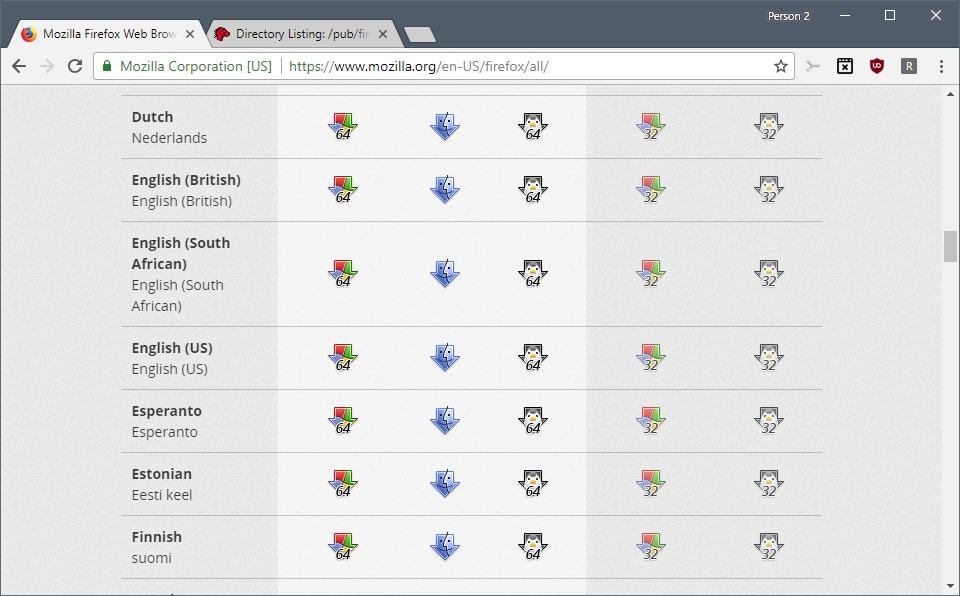
All you get when you hit the "download now" button on the Mozilla website to download a copy of the Firefox web browser is a so-called stub or net installer.
The stub installer has advantages and disadvantages over full or offline Firefox installers. Unlike the offline installer, which always installs the version of Firefox that you downloaded, stub installers query Mozilla during installation so that the latest version of Firefox is downloaded and installed. In other words, users will get the latest version of Firefox when they run the installer and they may re-use it.
The main downside is that setup requires an active Internet connection, and that the latest version of Firefox is downloaded and installed. While users want the latest version usually, older versions may sometimes be required, for instance when the latest version causes issues on a system.
You can use full Firefox downloads to install Firefox on systems without Internet connection, or for distribution purposes if you want to install it on multiple systems. With the web installer, you would have to download the browser multiple times (for each system once) which may waste a lot of bandwidth and time.
Firefox offline installers
You have two official options to download offline versions of the Firefox web browser to your system. You can download offline versions of Firefox from the Mozilla website or from the archive server. Both let you download a full copy of Firefox for all supported operating systems, architectures, and languages.
The core difference between the two options is that you can download any version of Firefox from the FTP server but only the latest version from the website.
So, if you always wanted to check out Firefox 0.10, Firefox 4.0, or Firefox 25.0, now is your chance to do so (if you do, please do so in a locked down environment as these browsers may contain security vulnerabilities that were fixed in later versions).
Mozilla website
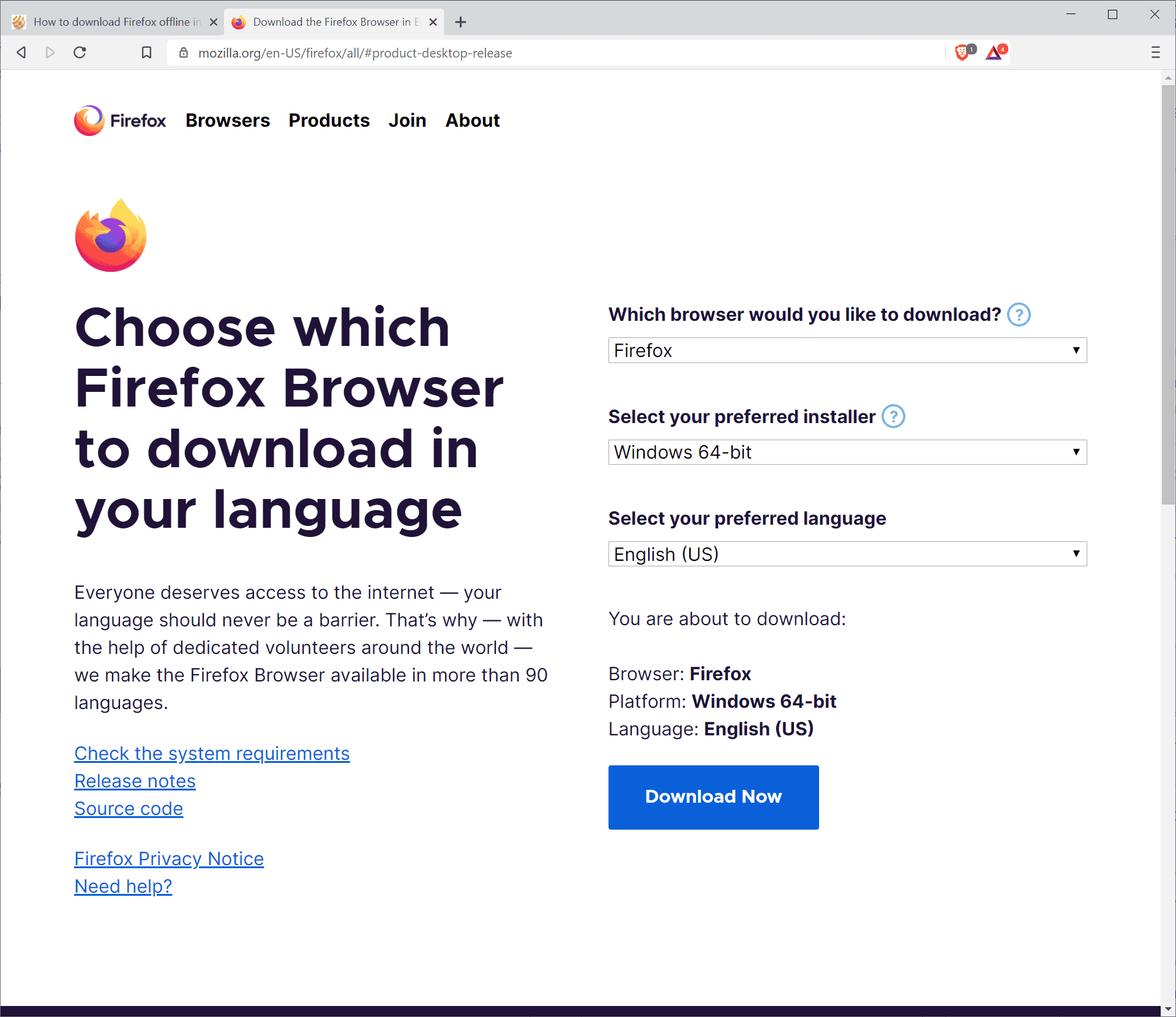
Note: Mozilla changed the design of download pages recently. While you can still use the links provided below to download offline installers for all supported operating systems, you now have to make up to three selections before you can do so.
Use the following links to open the Firefox offline installer download pages on the Mozilla website:
- Firefox Stable (offline): https://www.mozilla.org/en-US/firefox/all/#product-desktop-release
- Firefox ESR (offline): https://www.mozilla.org/en-US/firefox/all/#product-desktop-esr
- Firefox Beta (offline): https://www.mozilla.org/en-US/firefox/all/#product-desktop-beta
- Firefox Developer Edition (offline): https://www.mozilla.org/en-US/firefox/all/#product-desktop-developer
- Firefox Nightly (offline): https://www.mozilla.org/en-US/firefox/all/#product-desktop-nightly
Downloads for Android are also provided:
- Firefox Android (offline): https://www.mozilla.org/en-US/firefox/all/#product-android-release
- Firefox Android Beta (offline): https://www.mozilla.org/en-US/firefox/all/#product-android-beta
- Firefox Android Nightly (offline): https://www.mozilla.org/en-US/firefox/all/#product-android-nightly
All download pages use the same layout. Select the browser edition that you want to download, e.g. Beta or ESR, then the installer (Windows 32-bit and 64-bit, Linux 32-bit and 64-bit, Mac OS X, or Windows MSI 32-bit or 64-bit), and then the language. Hit the download now button to start the download of the full Firefox installer to the local system.
Mozilla FTP Server
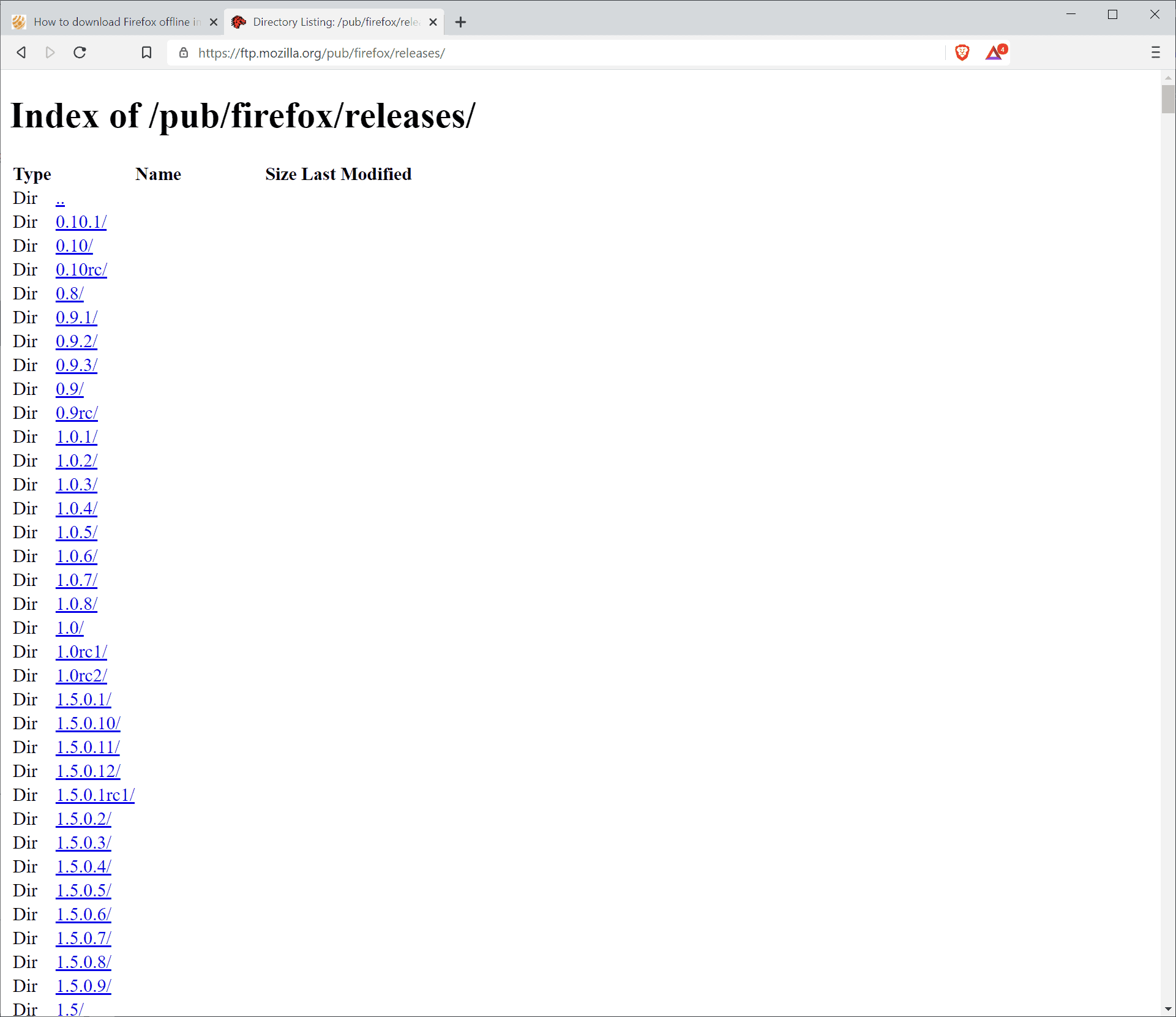
You access the Mozilla FTP server via HTTP right now using the following URL:
This opens a directory with links to all Firefox releases starting with Firefox 0.10 to the very latest (stable, beta and release candidate) releases. You can use the directory to download the latest release version of Firefox to your system but also any previous stable release of the web browser.
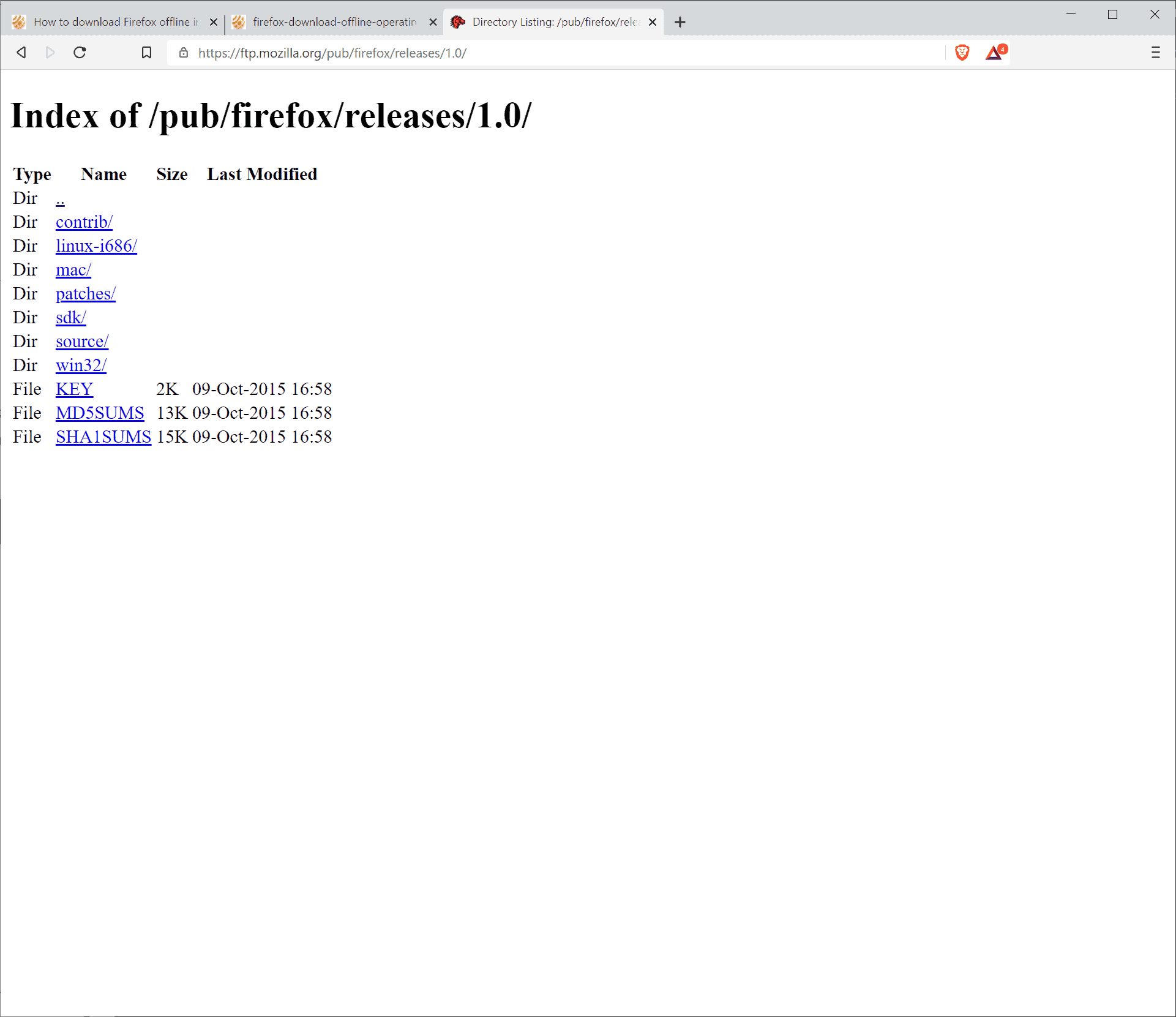
A click on a directory displays the supported operating systems on the next screen. The following options are usually provided (not that some may options may only be available for select versions and not all the time).
- win32 -- Windows 32-bit Firefox
- win64 -- Windows 64-bit Firefox
- win32-EME-free -- Windows 32-bit Firefox without Encrypted Media Extensions
- win64-EME-free -- Windows 64-bit Firefox without Encrypted Media Extensions
- Linux-i686 -- 32-bit Linux Firefox
- Linux-x86_64 -- 64-bit Linux Firefox
- mac -- Mac OS X version of Firefox
- mac-EME-free -- Mac OS X version of Firefox without Encrypted Media Extensions
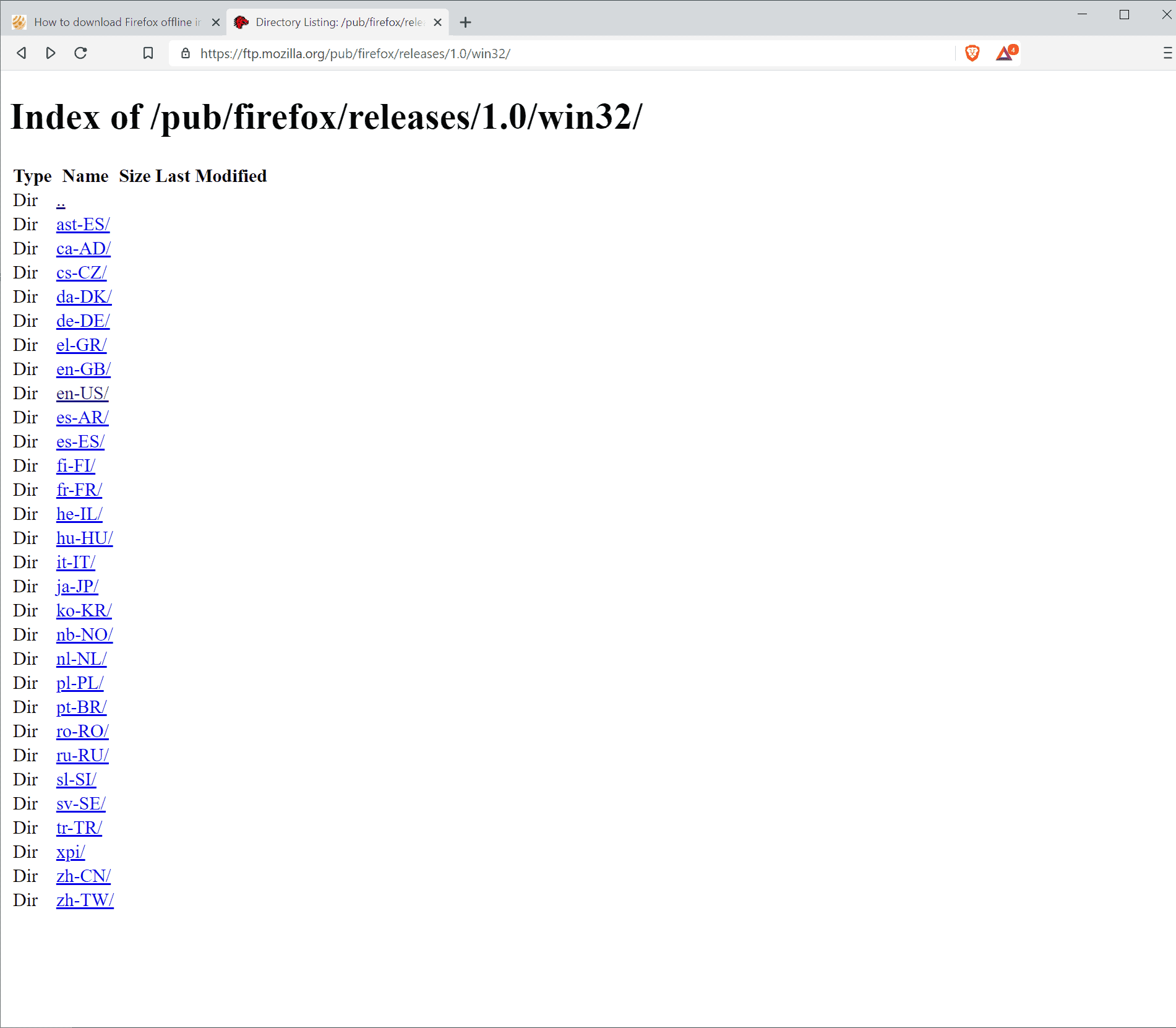
A click on one of the operating system directory links opens all localized versions of Firefox for the selected Firefox version and operating system. Mozilla uses language and country codes to list available versions.
The codes en-us, pt-BR, and hu, for example, refer to English-United States, Portuguese Brazil, and Hungarian. While a country's domain extension is used usually by Mozilla, it is not the case all the time.
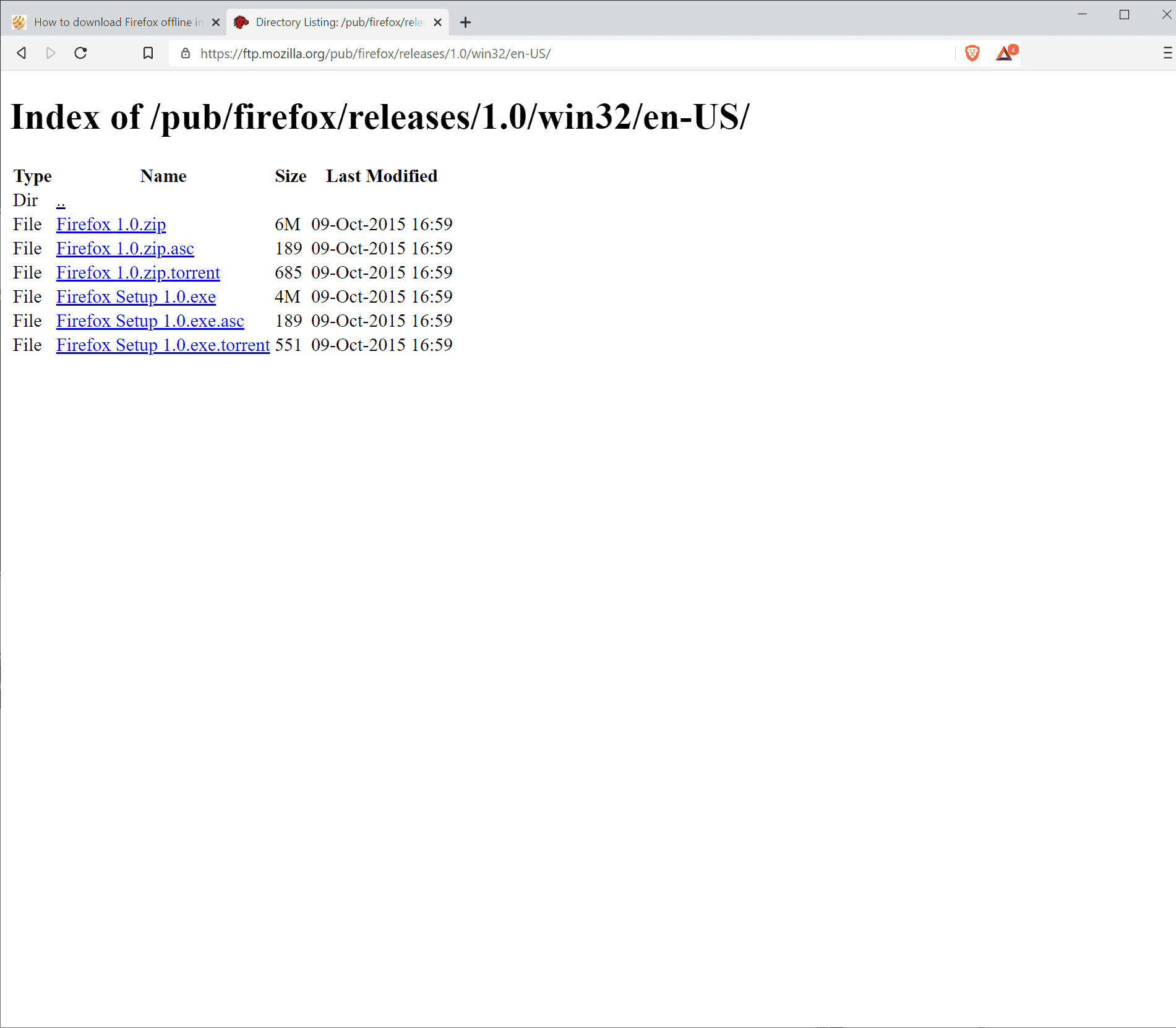
The final page lists the download link and the size of the download.
Tip: You can modify the URL of the download page easily to jump directly to specific releases. The URL structure is https://ftp.mozilla.org/pub/firefox/releases/60.0/win64/en-US/.
Simply change the following directories:
- version: 60.0
- platform: win64
- language code: en-US
While you can download full versions of the Firefox web browser from third-party download portals as well, there is no need to do so unless you want to download a portable version of Firefox.
Closing Words
Mozilla pushes the stub installer on its website and it may be the better solution for most users interested in downloading the web browser and for Mozilla. Users who prefer to download the full version of Firefox instead can do so as well and as long as the option is provided, there is nothing wrong with offering a stub downloaded by default.
Now You: Which version of Firefox do you download, and why?






















Hello friend I am from Brazil and I am grateful for the opportunity to download mozilla firefox, thanks until then.
will this work with the Alcatel model 40440 with kaios technologies and operating systems
i am not sure how to understand different hashes of win32 ff v5290esr setup at ftp site (there is two folders). perhaps because ff has to much versions through it is own evolution. there is no time for application code
2 days ago, I came across a lightweight, no-install application called ‘Firefox Download Tool’ by WinTools.Info (Peter Panisz) that some users might be interested in.
It allows you to download Firefox Stable offline installers from Mozilla’s servers via an easy-to-understand GUI. In other words, there is no need to manually drill through Mozilla’s multi-level web directory pages.
https://www.wintools.info/index.php/firefox-download-tool
https://www.techadvisor.co.uk/download/internet-tools/firefox-download-tool-12115-3331552
http://www.softpedia.com/get/Internet/Download-Managers/Firefox-Download-Tool.shtml
You can select either the latest version, or one of the last 30 POINT-release versions (eg. v55.0.3 or v58.0 or v59.0.3), as well as choose the preferred bitness (32/64-bit) & language.
To view the details of the chosen file, click “Copy Info to Clipboard” below the progress bar, & you can see the download URL & file hashes.
At the moment, the tool only supports downloading Firefox Stable, but not other builds like ESR, RC, Beta, Developer or Nightly.
There are three things I do not understand about the FF ftp archive.
1) Why did Mozilla remove the direct ftp: of files and convert access to https://ftp.?
2) With the extensive publishing of hash values for each and every release file, why are hashes never published for EME versions?
3) While the provision of hashes on the same site (page) as the file is valuable for insuring uncorrupted transmission, for security hashes should be on a separate server. (see Linux Mint breach). Why has Mozilla not followed such a set up?
@ q.: “Why did Mozilla remove the direct ftp: of files and convert access to https://ftp.?”
Below are some possible reasons for choosing (to wrap FTP in) HTTPS for public access. The issue to strike a balance in terms of optimizing security, transfer speed, & ease of access.
1) HTTPS (& FTP) can be accessed via the web browser, while FTPS & SFTP require the use of a dedicated FTP client. But since public end-users do not need (& are not allowed) to upload anything, public FTP (as well as FTPS & SFTP) access is somewhat unnecessary.
2) HTTPS uses a single port (443). FTP (ports 20 & 21) is natively insecure.
FTPS (more secure than FTP, but less secure than SFTP) uses multiple ports. FTPS opens an additional port for every file-transfer request & every directory-listing request. This might be an issue for users behind a heavily-firewalled network.
SFTP also uses a single port (22). But SFTP is very slow & consumes lots of bandwidth, compared to HTTPS & FTPS.
3) For HTTPS & SFTP, the entire session is encrypted. In contrast, FTPS sessions typically begin in an unencrypted state. If the client does not explicitly request security from the FTPS channel, the client may continue in an unencrypted state, such that data-transfer is not secured.
4) HTTPS downloads are usually not throttled. On the other hand, many ISPs impose bandwidth throttling on FTP, FTPS, & sometimes SFTP.
Im running portable WHY because I can.
I like having a copy ready to drop in when Fx…
While we are at it, the ftp-server also have all Thunderbird version
installers at hand.
Click on the version you want – choose lang. – dowmload and install
when ready to do so!
link: https://ftp.mozilla.org/pub/thunderbird/releases/
Gordon7.
Martin (or anybody else who also knows this) I have a question concerning the Mozilla FTP Server section of this article on the Mozilla website (under the Firefox 60 releases) I found some number like from what I think the first releases (like dir 7.0.1/ ,dir 7.0/ , Dir 7.0b1/ and more.
But I also finding (after the numers I mentioned here above) directories with names ( I mentioning them hereunder) I never heard of. Are those maybe future releases or very old release?
Dir bonecho/
Dir custom-updates/
Dir deerpark/
Dir devpreview/
Dir granparadiso/
Dir latest-beta/
Dir latest-esr/
Dir latest/
Dir namoroka/
Dir partners/
Dir sha1-installers/
Dir shiretoko/
Dir stub/
@ Paul(us): “directories with names I never heard of. Are those maybe future releases or very old release?”
Those are codenames referring to very old Firefox alpha releases uploaded to the Mozilla servers for archival purposes, egs:
☻ 2005: Deer Park
☻ 2006: Bon Echo
☻ 2007: Gran Paradiso
☻ 2008: Shiretoko
☻ 2009: Namoroka
Thanks, Gigologic
Nice to now. I thought so much but its always nice to know for sure!
Those will work probably on XP or even Millenium or even seven. But I am quite sure not on 10.
I also avoid using download stubs
It is important to have access to the original and complete setup.exe file, for all software that you install on your computer (including Firefox)
You often will need this original file – in case your computer crashes, and in case you wish to install it at a later date, for example on another computer
Having the original full setup.exe is also important, because software is often updated to a version that you dont like.
New versions of all software (including Firefox) can become incompatible with your existing computer setup, or have features that you dont want (including intrusive spyware, or poor design, or an intrusive ‘ribbon’, or poor addon support)
Lesson: always download and store the full setup.exe for every software program you use, if possible
I use ONLY the “real thing” and avoid stubs.
Download, save and archive the original setup.exe file.
Exactly for reasons outlined in your post
I hate that stub installer, and I always wondered what the rationale for it was. Now I understand better why it exists. Thank you. I’ll continue to avoid it.
Since Linux versions of Firefox can’t update themselves, I use the Ubuntuzilla repositories which contain Debian based packages. This has been useful for the ESR version which many distros do not include.
For more info see https://sourceforge.net/projects/ubuntuzilla/
Crawling (or crying ?) down the Neonate Firefox Nostalgia lane — if you have Windows 95/98/ME/NT/2000 …
File size of EXE offline installer for:
♥ Firefox v0.10 “GREENLANE” Preview Release (14 Sep 2004): 4.52 MB
♥ Firefox v1.0 “PHOENIX” (09 Nov 2004): 4.69 MB
There were user reports that Firefox v1.0.4 — released on 11 May 2005, ie. exactly 13 years ago — worked well on Win 95 with 80 MB RAM, although Mozilla only officially supported Win 98 to Win 2000 since the v0.10 Preview Release.
1) Missing from the article (which currently only lists the latest Stable, Beta, Developer & Nightly builds):
☻ Latest Firefox ESR builds (offline installer):
https://www.mozilla.org/en-US/firefox/organizations/all/
→ available as of 09 May 2018: v52.8.0 ESR & v60.0 ESR
2) From article: “You access the Mozilla FTP server via HTTP right now using the following URL: http://ftp.mozilla.org/pub/firefox/releases/ ”
Incidentally, the FTP server can be accessed via HTTPS. The SSL certificate is issued by DigiCert SHA2 Secure Server CA. And the Developer & Nightly builds are hosted on separate pages:
☻ Stable, ESR, Beta & Release Candidate builds:
https://ftp.mozilla.org/pub/firefox/releases/
☻ Developer builds:
https://ftp.mozilla.org/pub/devedition/releases/
☻ Nightly builds:
https://ftp.mozilla.org/pub/firefox/nightly/
3) From article: “The core difference between the two options is that you can download any version of Firefox from the FTP server but not from the website.”
Below are the links for offline installers of all versions (from historical to latest) & all builds for various platforms on the Mozilla.org website, as well as its CDN servers. The pages sport an identical directory structure as those hosted on the FTP server.
☻ Stable, ESR, Beta & Release Candidate Builds:
https://releases.mozilla.org/pub/firefox/releases/
https://archive.mozilla.org/pub/firefox/releases/
https://download-installer.cdn.mozilla.net/pub/firefox/releases/
https://download-origin.cdn.mozilla.net/pub/firefox/releases/
☻ Developer Builds:
https://releases.mozilla.org/pub/devedition/releases/
https://archive.mozilla.org/pub/devedition/releases/
https://download-installer.cdn.mozilla.net/pub/devedition/releases/
https://download-origin.cdn.mozilla.net/pub/devedition/releases/
☻ Nightly Builds:
https://releases.mozilla.org/pub/firefox/nightly/
https://archive.mozilla.org/pub/firefox/nightly/
https://download-installer.cdn.mozilla.net/pub/firefox/nightly/
https://download-origin.cdn.mozilla.net/pub/firefox/nightly/
While we are at it, the ftp-server also have all Thunderbird version
installers at hand.
Click on the version you want – choose lang. – dowmload and install
when ready to do so!
link: https://ftp.mozilla.org/pub/thunderbird/releases/
Gordon7.
Thanks!
I avoid software with net installer only.
Many many thanks for this information Martin.
At least Mozilla has the decency to keep this option open, altough they could have made it easier for the people who don’t happen to find this information. I had hoped they would, as I knew they used to do in the past, but so far I had not found it anymore.
I had to reinstall Windows on my XP in medio 2015, and at the same time I installed the then active version of Firefox, 39.0 it was, with a number of addons. I immediately blocked updates, which appeared to have been a good decision when afterwards reading about all the adventures of that Mozilla…
Today, this setup is still working as fine as it was then. Despite all trolls calling me nuts for that. But somehow I did not keep the installer, it must have been the stub at the time. So, responding to your article, I quickly went to download it today. Successfully. I keep it for in case… , though I am meanwhile using New Moon by default, with the same addons.